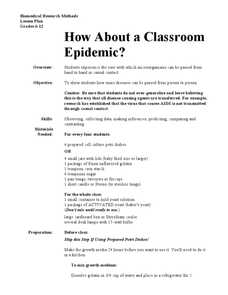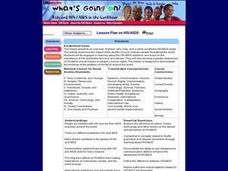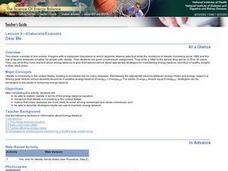Centers for Disease Control and Prevention
Solve the Outbreak
Pretend to be an Epidemic Intelligence Service officer for the Centers for Disease Control and Prevention. Detectives deal with data and make decisions to determine the dawn of the disease!
Baylor College
Mapping the Spread of HIV/AIDS
Where is HIV/AIDS most prevalent and what are the current trends regarding HIV? Have groups work together to map the world's HIV/AIDS rates, then create a class map with all the data. Lesson includes cross-disciplinary concepts including...
Curated OER
Kildare, USA: An Environmental Health Simulation
Your biology class plays the role of epidemiologist when a mysterious illness breaks out in Kildare, USA. Using interviews with doctors, patients, and local citizens, maps, the results from different materials sampling, they work to...
Curated OER
How About a Classroom Epidemic?
Have individuals wash their hands with soap and water, give one of them a yeast-covered piece of candy, and then have him shake hands with the person next to him. Handshakes continue down the line until everyone in the class has had...
Curated OER
Fizzies Virus
Sixth graders discover how disease spreads. In this disease control lesson, 6th graders brainstorm a list of diseases and simulate how a disease spreads by using cups of hydrogen peroxide and water. Students create the "Fizzies Virus"...
Curated OER
1928 Flu
Students state the some diseases are the result of infection. They describe the risks associated with biological hazards, such as viruses. Pupils name ways that infectious disease can be prevented, controlled, or cured. Students...
Curated OER
DEMONSTRATING AN EPIDEMIC
Students experience a small scale "epidemic," demonstrating the ease with which disease organisms are spread, and enables the student to determine the originator of the "epidemic." They transfer live bacteria by hand contact, then...
Curated OER
Viral Invaders
Students conduct a critical investigation of the West Nile Virus. They assess the relationship between the sources of information and their credibility. Students use their findings to create a public health campaign about the virus.
Curated OER
HEALTH AND BEHAVIORAL STUDIES
Students select a country in South Africa and writes a one-page report on the economic and social issues facing that country, offering suggestions as to how the conditions of poverty and HIV/AIDS.
Curated OER
Africa Falls Prey to H.I.V.
Young scholars use maps, statistics, and written texts to recognize the H.I.V. explosion in Africa.
Curated OER
AIDS TODAY
Learners study the AIDS epidemic. In this health policy instructional activity students divide into groups and research the Internet to obtain information on AIDS.
Curated OER
Epidemic, Plague, and Infection
Students investigate the illness borne in concentration camps. In this Holocaust lesson, students participate in a simulation that requires them to consider how ailments became epidemics in concentration camps.
Curated OER
Analyzing the S-I-R Model
In this SIR model learning exercise, students analyze a real life problem using the SIR method. They explore given facts and determine the threshold value for an epidemic, the sequence for the recovery period, and the effect on the...
Curated OER
Epidemic or False Alert?
In this rate worksheet, students use the SIR model to determine if a disease is spreading at an epidemic rate. They find the slope of a curve and the slope of a line that goes through a given point. This two-page worksheet contains...
Curated OER
Simulating the Spread of an Infectious Disease
In this health worksheet, students identify various infectious diseases and explore the available options for stopping or preventing the spread of disease. They participate in a simulation experiment on how to measure and prevent. There...
Curated OER
Lesson Plan on HIV/AIDS
Students examine where, why, how and in what conditions HIV/AIDS exists. They examine the deadly impact this virus has had on the world and look at how to prevent the spread at home. The students also develop a greater awareness of the...
Curated OER
Disease and Culture through Literary Time
Students select books to read that include disease as a plot or theme component. They fill out a matrix for the disease in their novel and write a five-paragraph paper about their book. Students use the rest of the week's classes to...
Curated OER
Demonstrating an Epidemic
Students use an experiment that allows them to experience a small scale "epidemic", demonstrating the ease with which disease organisms are spread. Students determine the originator of the epidemic. They transfer live bacteria by hand...
Curated OER
History: Burial Ground Research
Students participate in a cemetery scavenger hunt and determine the average life span during a specific time period. The information for the project relates to the specific historic time period they are investigating.
Curated OER
Protecting the Herd
Students simulate the spread of a fictitious disease using an internet-based simulation. In this biology activity, students predict the factors that could affect epidemic. They investigate these prediction using computer simulation.
Curated OER
Social Studies: When Diseases become Epidemic!
Student participate in oral discussions to be able to define epidemic and identify 3 instances in history in which epidemics occurred. They are introduced to the quarter theme, disease. Students identify disease as a crucial dictator...
Curated OER
Social Studies: Reasons Diseases become Epidemic
High schoolers identify reasons diseases become epidemic and list them in web format. They explore additional questins to to better investigate the time periods mentioned: 14th century, America at contact and the Age of Industry.
Curated OER
Health: Dear Me
Students examine data supporting the increase in health risks due to obesity. They write letters to their future selves giving strategies for maintaining a healthy weight in adulthood by maintaining an appropriate energy balance.
Curated OER
Epidemic!
Students research recent episodes when diseases like colds or flus spread through their school. It also asks them to think of public health measures that might stop a disease from spreading again.

























